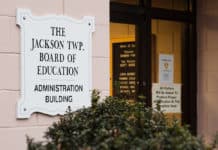
JACKSON – Did Jackson officials violate the law by holding a private meeting at the municipal attorney’s office?
Resident Elenor Hannum accused the five-member council, mayor and three Municipal Utility Authority members of holding a “secret meeting” on December 3, a Saturday, at the municipal attorney’s office in Toms River. A local online news outlet posted pictures provided by anonymous Jackson residents showing township officials entering and leaving that office.
 Gavin Rozzi of PoliticsOC, who received the video, scrutinized the video and confirmed the metadata showed a December 3, 2016 timestamp and was not tampered with. He added he didn’t know how those residents knew the meeting was taking place. The video recording alleges these officials entered and exited Gilmore’s office: council members Rob Nixon, Kenneth Bressi, Barry Calogero, Scott Martin and Ann Updegrave; Mayor Michael Reina; Jackson GOP Chairman Bill Allmann; Clara Glory and Todd Porter, who serve on the MUA; and attorneys Jean Cipriani and George Gilmore. All attending are Republicans.
Gavin Rozzi of PoliticsOC, who received the video, scrutinized the video and confirmed the metadata showed a December 3, 2016 timestamp and was not tampered with. He added he didn’t know how those residents knew the meeting was taking place. The video recording alleges these officials entered and exited Gilmore’s office: council members Rob Nixon, Kenneth Bressi, Barry Calogero, Scott Martin and Ann Updegrave; Mayor Michael Reina; Jackson GOP Chairman Bill Allmann; Clara Glory and Todd Porter, who serve on the MUA; and attorneys Jean Cipriani and George Gilmore. All attending are Republicans.
Hannum told council at its December 13 meeting that the December 3 meeting they held violated the Open Public Meetings Act. Council president Nixon did not deny there was a meeting that day at municipal attorney and Ocean County GOP chairman Gilmore’s office, but refused to answer questions about the meeting’s content, saying the meeting did not violate OPMA. The meeting, he said, was a political caucus meeting.
“When was the last time a political caucus meeting has occurred,” Hannum asked.
“I don’t believe that’s a relevant question to council,” Nixon replied.
“At the last council meeting, a question came up questioning whether how much influence George Gilmore has on politics in Jackson Township?”
“Are you asking a question? I think that’s kind of a general question that’s kind of a pointed question. To be honest with you, Elenor, none. He has zero impact on the decisions made on this dais.”
“Then, I must ask you. Was there a secret meeting on December 3, 2016?”
“The Township council, separately from our political roles, we’re permitted to meet with anybody in a political context that we want to, so long as township business is not discussed outside of that context.”
Municipal attorney Jean Cipriani responded to The Jackson Times’ inquiry the following day about the legalities of the meeting. Cipriani cited N.J.S.A. 10:4-7, which excludes political caucuses from the OPMA.
“Typical partisan caucus meetings and chance encounters of members of public bodies are neither covered by the provisions of this act, nor are they intended to be so covered,” it reads.
Attorney Edward Purcell of the New Jersey League of Municipalities, Trenton, agreed that political caucuses are not subject to OPMA. In an email to The Jackson Times, he explained why.
“That assertion is correct—meetings of political caucuses are exempt from OPMA. OPMA doesn’t define the term and courts have, at times, struggled to apply this exemption,” Purcell wrote. “A practical shorthand would be meetings of members of the same political party that focus on discussing the political ramifications of local matters, not the substantive merits of the issues or discussions of which way individual governing body members will vote.”
John Paff is the treasurer for the New Jersey Foundation for Open Government. He is also chairman of the New Jersey Libertarian Party’s Open Government Advocacy Project as well as the NJLP’s Preempted Ordinance Repeal Project. Paff’s blog, njopengovt.blogspot.com, reports on open government issues from across the state.
He, Purcell and Cipriani all referred to the 2008 case, Mountain Hill, L.L.C. v. Twp. of Middletown, which NJ Superior Court Appellate Division ruled that Party (political) caucus meetings were not subject to OPMA.
Paff read from the decision.
“Although the all-Republican Committee left them in the ‘land of shadows between typical partisan caucuses and open public meetings,’ – that’s a great quote, I would think, that the courts themselves have called this problem we’re talking about land of shadows between typical partisan caucuses and open public meetings – ‘we are more than satisfied in this case that Committee members did not go beyond typical partisan caucuses.’ Based on what the committee members themselves said,” Paff said. “That’s a problem.”
Residents can lodge complaints with county prosecutor’s office or state attorney general if they believe the OPMA has been violated. They can also sue in NJ Superior Court. But the process is time consuming and very costly, Paff said, and unlike Open Public Records Act violations where victors have court costs covered, OPMA cases offer no financial compensation, even if the complainant wins.
If the court does find a violation occurred, a fine of $100 is levied for the first offense, and anywhere between $100 and $500 for subsequent offenses.
Hannum could not be reached by press time to say whether she planned to sue.
Paff spoke generally on political caucus meetings and stressed he’s not accusing Jackson officials of breaking any laws.
“I’m not naïve enough to think that a member of a municipal council that is controlled by one party would not use the Middletown decision and sort of make it maybe the last item of business at their caucus meeting, ‘Okay, if anybody asks, remember that what we talked about here is only what is of importance to the party on these issues and how we’re going to spin political items of importance to our town and how we’re only going to talk about the political pulse of our town,’” Paff continued.
He said that it is still problematic because who is verifying what was discussed? Paff said: “But they can actually discuss anything under the sun, and it seems that the burden of proving that they did not do that is upon the public who are not even aware in most cases that they meeting took place, and even if they are, have no idea as to the content of what was discussed.”
Council vice president Kenneth Bressi spoke to The Jackson Times and strongly reiterated that the meeting was a political caucus that did not address any township issues.
“It’s 100 percent political, it’s 100 percent legal. We’re allowed to have them,” Bressi said. “This word ‘secret’ putting to it is something else. Just so you know, when we do a closed session for the night at a regular meeting, we get told we’re doing backroom deals there. It’s the same expression. There’s time you have confidentiality. This is a political caucus.”
He added that most election bodies, whether Republican, Democrat or Independent, have meetings like this. They can be held any time of year.
“If you have a difference with a political ally, or a peer of yours, and you want to straighten it out amongst yourselves, you call a political caucus meeting,” Bressi said. “There are very strict guidelines of what you can speak on.”
Cipriani added via email, “There is no specific list of individuals who must be present for a political meeting in the law. It is typical for a local and/or county political party organization to be represented by Chairperson and/or President or other designee.”
Gilmore is the GOP county chair, Allman is the Jackson GOP Municipal Chair.
The OPMA, known popularly as “The Sunshine Law,” was approved in October 1975. It defines a public body, public meeting, adequate notice, closed sessions, and meeting minutes. The law exempts political caucuses from its terms, but doesn’t define what a political caucus is. It’s the courts, a costly prospect, that often decide.
The Jackson Times contacted the NJ American Civil Liberties Union, which does involve itself in open government issues, for this story. They did not respond by press time.





